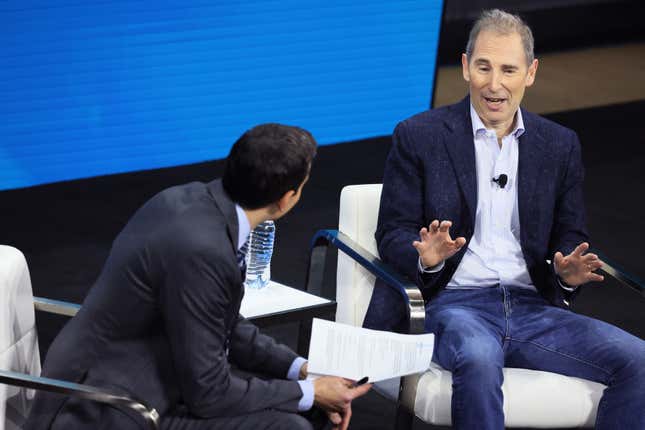
Amazon CEO Andy Jassy had a lot to say about his employees’ efforts to unionize in 2022. But those comments, made casually to media outlets, violated federal labor laws, a National Labor Relations Board (NLRB) judge ruled this week.
“I find that Jassy’s comments threatened employees that, if they selected a union, they would become less empowered and would find it harder to get things done quickly,” Brian Gee, an Administrative Law Judge, wrote in his ruling Wednesday. “Jassy’s comments that employees would be better off without a union were accompanied by his coercive predictions about the effects of unionization.”
Jassy told CNBC, The New York Times, and Bloomberg that Amazon workers’ efforts to unionize would change the culture of the workplace and make it less efficient. An Amazon spokesperson said in a statement to Quartz that it plans to appeal the ruling.
“The decision reflects poorly on the state of free speech rights today, and we remain optimistic that we will be able to continue to engage in a reasonable discussion on these issues where all perspectives have an opportunity to be heard,” said spokeswoman Mary Kate Paradis.
The NLRB cannot hold Jassy personally liable nor order Amazon to pay punitive damages.
Here’s what Jassy said
Quartz compiled Jassy’s full 2022 remarks that were reviewed by the NLRB.
Jassy made the following comments to Andrew Sorkin on CNBC’s Squawk Box in April 2022.
You know, first of all, of course, it’s ... employees’ choice whether or not they want to join a union. We happen to think they’re better off not doing so for a couple of reasons at least. You know, first, at a place like Amazon that empowers employees, if they see something they can do better for customers or for themselves, they can 25 go meet in a room, decide how [to] change it and change it. That type of empowerment doesn’t happen when you have unions. It’s much more bureaucratic, it’s much slower. I also think people are better off having direct connections with their managers. You know, you think about work differently. You have relationships that are different. We get to hear from a lot of people as 30 opposed to it all being filtered through one voice.
Then in June, Jassy made these remarks during an event at Bloomberg Technology Summit in San Francisco.
Well I, you know, I think that—and the first thing to [be] clear about is that employees get to make that choice whether they want to have a union or not. They 5 always have had that choice and it continues to be their choice and, you know, we happen to think they’re better off without a union for a number of reasons, including the fact that, you know, it’s, it’s much harder when you have a union to have a direct relationship with your manager and to get things done quickly. So if you see something on the line that you think could be better for your team or you 10 or your customers, you can’t just go to your manager and say, “Let’s change it.[“] So, you know there’s a whole process and bureaucracy which you have to go through to be able to do that. You know, and we get—you know, when there’s a union, we’re gonna get the feedback filtered by what the union decides is worth bringing up but we’d much rather hear from every employee whatever is on their 15 mind . . .
That November, Jassy spoke to Sorkin again during The New York Times DealBook Summit during a televised interview.
. . . And what we tell our employees in our fulfillment centers is that we think they’re better off without a union for a few reasons. One is we try to hire people 25 who we empower, if they find ways that they can make the experience better for customers or their fellow teammates, they can just go fix it. You know, they, they don’t have to go through a union. It’s not bureaucratic, it’s not slow, it’s not a whole pro. . . . They can just go fix that. We think that that’s pretty empowering and a great way to work. And I think it’s nice to be able to have a direct 30 relationship with your manager. We like to hear from all our employees as opposed to having it filtered through one or two voices. . . .